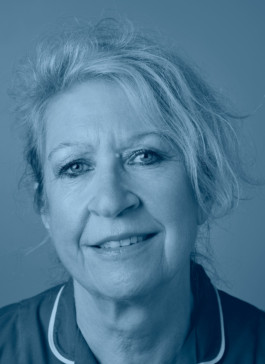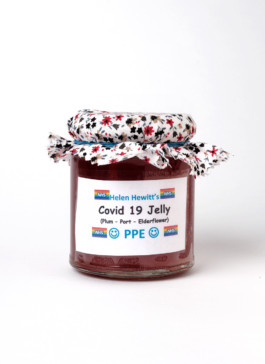Helen: “Actually it’s OK not to be OK. We all have days when we’re not OK and that’s fine”


listen:
Photography: Lottie Davies
Audio Producer: Sara Conkey
read:
I picked the plums from my allotment and then I just took all of the stones out and then boiled them up with some water, just a little bit of water. Also with the star anise and a cinnamon stick in there as well. And then I added a little bit of elderflower and, right at the end, some port.
The label says ‘COVID-19 jelly, Helen Hewitt, NHS, plum port and elderflower, PPE’. With two smiley faces. So I’ve made several batches now and I’ve got 10 pots of the said jelly. It’s nice. I mean it needs work. It needs work. But this is an evolving disease; this is an evolving jelly.
I’m Helen Hewitt, and I’m a Matron at the Royal London Hospital on the Adult Critical Care Unit.
It is one of the largest, busiest trauma units in London. It is a sink-or-swim place. It’s a bit like Marmite: you either love it or hate it. You learn everything there. I trained there, I’m biased, but I’ve come back, and it felt like coming home. And actually, one of the consultants said to me, ‘Helen, we’re family.’
When it all started, it was a can-do will-do situation during this pandemic. We’ve got 44 beds on our Adult Critical Care Unit. And at the peak, we think we had 89 patients. We had 400 staff from all over the organisation to come and help us, and some of which had got no critical care experience, or even any acute care experience. And also the way we looked after the patients – because of the volume and everything, we had to change the ratio of which we looked after them.
So for a level three patient on a ventilator, it’s one nurse to one patient. We had to do things differently. At the peak of the pandemic, you might be in a situation where you’ve got one nurse – one ITU nurse, experienced nurse – for three ventilated patients. With the help of two other nurses, the ITU nurse would take charge and you’d find out about what skills the people would have. And you know what they were able to do – whether they were able to give drugs, whether they are able to do personal care. And the ITU nurse would delegate the sort of roles and responsibility.
And I think everyone went through stages when they felt a little bit overwhelmed by the speed at how this was evolving and how sick the patients were. Some of those staff hadn’t experienced, you know, death. And it’s terrifying if you haven’t looked after that sort of patient who’s really really sick. There was a lot of Zoom end-of-life calls, for example. For us as nurses, it’s not, that’s… that’s not the way it’s done. I couldn’t bear to think of someone I really loved and not being with them as they passed away. It’s what people have when they go home, go away from the hospital. It’s the memories they keep for the rest of their life. It’s something that has to be done really well.
And I think quite – well it’s normal – quite a lot of the staff had periods when they sort of… not hit a wall, but felt that they needed to have a break from all of this. But I think it is the nurses that are looking after the patients, so it’s just so important that that I look after them. You know, have the proper conversations with people: ‘How are you?’. Not just the sort of…. Sit down for 20 minutes in the office, or just in the corridor, in the coffee room with a cup of tea. And just say ‘How is it for you?’.
And then you’d have stories about how they felt guilty about this, or felt like that, or what their experience had been like, and not being able to do everything you wanted for your patient. That’s really tough for us as nurses because we want to wash people’s hair and get to know the families and what the patient was like and have those conversations. So you look after someone as a whole.
We had a rag rating system – red, amber green – and we’d have a sort of round the table exercise, ‘How you feeling today?’, and one, you know one of the members of staff who was doing the rota, she might say ‘Oh, I’m red today’.
And actually it’s okay not to be okay. We all have days when it’s not okay. And it’s fine. You know, days when we cry. Some days I was quite amber. You never really switch off. I also used to wake up early in the morning and worry about things. You know, my clock would be four o’clock, argh, and my mind would just be thinking, ‘Ahh, what’s this? What’s that? What do I need to do?’.
I was becoming unwell, and I didn’t really realise it in myself. And I didn’t, I didn’t… I was just exhausted. I didn’t feel 100% and then I sort of came home and was a bit grumpy with my husband because he hadn’t cleaned the patio. He’d made me dinner when I got home. I said, ‘Well, why didn’t you put any salt and pepper in here?’ and he said, ‘Helen, there’s 8 cloves of garlic in this’ and I’d just completely lost my sense of smell and taste. And it was at that point I was swabbed. And yeah, it came back positive, so I was off work then. I wasn’t really really sick. I didn’t have, you know, sort of chest… I didn’t need to go to hospital. But I was just exhausted. But I couldn’t switch off. And I just, I felt guilty because I wanted to go back to work and run it.
I think the pandemic, for what it’s… it’s taught me how important it is to look after the staff or how to look after each other and look out for each other, support each other, help each other.
I wrote letters to the staff that were redeployed to say thank you and to say, you know, without you guys we couldn’t have done any of this. You’ve been fantastic. I remember talking to one and they said, ‘Thank you for that letter. I got that letter, and it made me cry. And I took it home to show to my family’. And, you know, I suppose I underestimated how much that would have meant, but that was a good thing to do, you know.
During the pandemic, obviously, there was little time to spend time at the allotment. But now, as things calm down a bit, I’ve got a little bit more time. It’s a place of solace for me. It’s a place that I can just be. And I didn’t think anything would grow this year, nothing. But actually, I’ve had the most amazing crop. I can’t believe it. This year I’ve got, I’ve grown potatoes, Désirée and Charlotte. I’ve grown butternut squash, rhubarb, gooseberries, red currants, raspberries, peas, mangetout, carrots, parsnips, tomatoes, tomatoes galore.
Nothing’s ever perfect, but I hope we did what we could. I can’t really believe what we achieved as a team and how we managed to look after all of these patients that came through the door, and I feel immensely proud of all of that.
An Empathy Museum project made with the support of NHS England and NHS Improvement, The Health Foundation, and Arts Council England